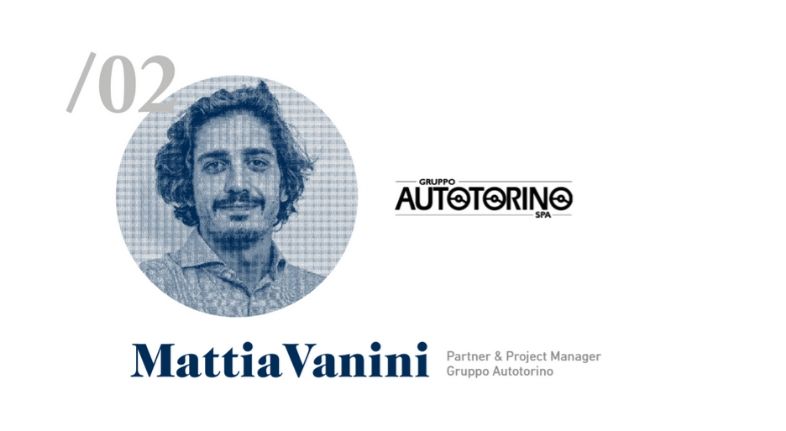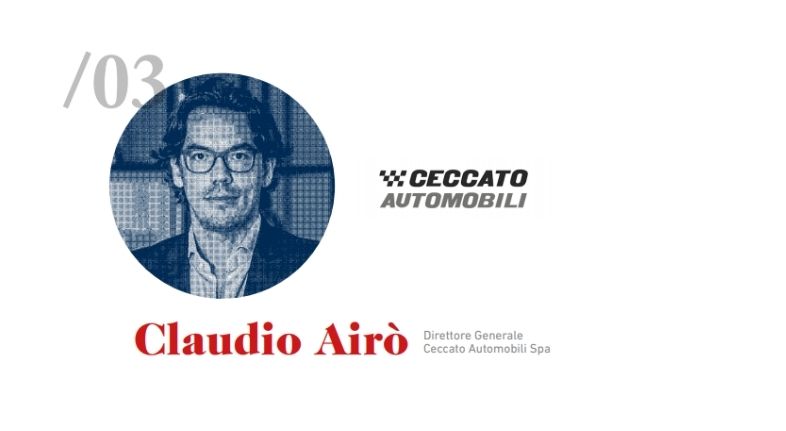- Mail:
- info@digital4pro.com
Automotive industry: Mattia Vanini, Partner & Project Manager Gruppo Autotorino

Automotive industry: Dario Palma, Product & Innovative Services Manager – Mercedes-Benz Italia S.p.A.
16 Luglio 2020
Automotive: Mattia Vanini, Partner & Project Manager Gruppo Autotorino
20 Luglio 2020The pandemic appeared when the automotive industry, and the sector of mobility in general, was undergoing a transformation in terms of both the way customers access products and because of the increasing importance of environmental issues, with the resulting implications on the ongoing debate between internal combustion, hybrid and electrical engines. How are showrooms facing this scenario in the phase of the reopening of markets?
Everything around us has changed a great deal but in the relationship between man and the automobile, one aspect remains immutable: a car means freedom to dream, move and work. And, over the years, to underscore this sense of freedom, the issue of flexibility has become increasingly relevant, especially in terms of purchase options. There has been a move away from the rigid concept of pure ownership of a car as an asset towards the flexibility of its use as a tool; we’ve gone from direct purchase to loans, leases and long-term rentals. Autotorino succeeded in grasping this transition, firstly by creating and consolidating its collaboration with leading finance and insurance companies, in order to offer its customers increasingly bespoke solutions, before later founding RENT2GO, the first completely Italian long term rental company to evolve from a Dealership, in partnership with the Barchetti Group and Banca Popolare di Sondrio. This choice was conceived to offer customers – private individuals and companies alike – all the convenience of a rental service accompanied by a level of service one would normally expect from a dealer, through a personal consultant and an extensive assistance network from the branches of the founding groups covering all of Northern Italy.
The COVID-19 pandemic simply provided a further acceleration in the evolution and redesign of the options provided for using cars. The key concept is to reassure customers, given that their relationship with cars is based on necessity. For this reason, special solutions have been created with a postponement of six months for the first instalment or fee, with no down payment, ‘guaranteed credit’ coverage and specific forms of protection (including forms of protection for people) linked to the ongoing emergency.
In terms of the debate surrounding the ‘product’, there can be no doubt that, as the range of available options increases, it’s going to be possible to continue improving the personalisation of the public’s mobility requirements.
The competitiveness of electrical vehicles will be determined by the development of the recharging infrastructure; however, the disappointing results of government incentive schemes for the purchase of electrical vehicles has shown this is still a niche segment in Italy. A broader perspective is required on this subject: there is a need for a profound renewal of the vehicles in circulation (more than 13 million vehicles on Italian roads are older than Euro 4), by focusing on scrapping the oldest and least secure cars with the biggest environmental impact, in favour of hybrid and electrical vehicles but also more recent models, given the high efficiency of Euro 6 technologies in terms of consumption and the reduction of emissions.
We are, nevertheless, up to speed with the evolution of electrical mobility, by focusing firstly on training: from the showroom to assistance, we can offer the public specialist support.
Last but not least, on the subject of the environment, we believe we can make a difference beyond the mix of vehicles we can sell. Autotorino is involved in a management process with the aim of respecting the environment, reducing consumption of raw materials and saving energy costs and consumables, while also improving the quality of the experience of our customers. An example of this is the NOPaper project, which was awarded the National prize for Management Innovation at the Automotive Dealer Day in 2018 and which continues to evolve: in the space of three years, this has progressively led to contracts and documentary procedures being managed in an electronic format, with significant results. For example, more than 90% of transport documents issued by our warehouses and repair shops is now only digital. Aside from savings in terms of paper (which we have estimated as 5 million sheets of A4 paper per year), filing processes are also easier and more efficient (in 15 seconds we can manage up to 100,000 search results), for both our offices and our customers, who can now sign commercial or assistance documents with electronic signatures or OTP certificates, and receive certified documents at their email address in real time.
The web, social media and apps for mobile phones are now vital ‘locations’ where we can look for information or exchange communication
What impact will Covid-19 have on car user behaviour (car sharing, rental, etc.) and on the resulting purchase behaviour?
Today cars are an extension of that safe zone we perceived in our homes during the lockdown. Cars can offer ‘shelter’, independence and peace of mind. This is also confirmed by a recent survey published by La Stampa newspaper, which shows that this summer 71% of Italians will travel to their holiday destinations in their own cars, compared to 55% who did so last year. So for people, being able to rely on a car they own or which they have exclusive use of represents a comfort zone they will not be keen to do without.
With regard, on the other hand, to the purchase experience, even back in February, there were signs the public was more keen and curious about digital interaction. We therefore promptly accelerated the fine-tuning and integration on the digital side of the experience we offer in our showrooms: firstly by launching new means of access to our services, with the introduction of the option of video calls; beyond this, we have also introduced new protocols and services, such as the option of signing remote contracts with secure and remote electronic signatures with OTP Secure Call, which strengthens and extends relationship potential. These protocols are also applied for signing documents in showrooms because they represent a security feature that is now integrated in our processes and which our customers like. This is all then complemented by purchase options designed specifically for this unusual moment in time and which protect customers and increase the flexibility and sustainability of purchases, including, for example, by removing the need for down payments and extending the deadline for the first instalment until the start of 2021 (as explained above).
The service has been an important component for some while, including in terms of margins for dealers. Will we now see a focus on integrating new services or a redesign or consolidation of existing services?
The service is the area where the relationship with the public develops and consolidates and is a process which helps retain an important source of capital within the company: our customers.
This is why we decided to extend the range of our services beyond the physical perimeter of the workshop: this is the case of the Pick Up & Delivery option, which can be requested for each of the Brands we represent, from premium brands to general purpose brands, for a level of care that enables customers to manage their time as they see fit; and there is also the road recovery service available 24 hours a day, through a geo-localised video call, thanks to the App Autotorino CON VOI, that can also be combined with an analogous medical assistance service. The evolution of the model of service offered in Autotorino and Autostar branches thereby also extends the way in which ‘post-sales’ is interpreted, by making it flexible enough to accommodate the habits, preferences and requirements of our customers.
The automotive sector had already grasped the opportunities connected with the digital world prior to the emergency. In recent months the focus and interest by many sectors towards digitalisation – as a sales channel and a means of interacting with customers – has increased even more rapidly. What, if anything, is changing in the automotive sector? What role will the showroom have as a physical and real space? What marketing and communication strategies can we expect to see in broad terms and what are the specific plans for online marketing and communication to end users?
The Autotorino Group model’s has been refined in twenty years of development, during which the digital side has evolved hand in hand and in a functional manner with the physical network. As soon as Autotorino began to have more branches, we were faced with the need to share information, standards and processes across these. Since then we have always believed that our digital dimension is at one with the model of service expressed by the various branches. Everything is interconnected, and so too are our Customer’s requirements. The electronic backbone that joins together business intelligence tools and management systems has enabled us to share a platform of communication and information across all branches and this has become a bedrock and enabler of the Group’s growth. This has also allowed us to connect easily and in a natural manner with end Customers. With increasingly customised forms of communication, there will be even more access opportunities to new services, not just for the purchase of cars, but also for the protection of people.
People will play a central role in this process. The web, social media and apps for mobile phones are now vital ‘locations’ where we can look for information or exchange communication. Online just as it is in-store, the quality of a relationship stems from the speed and professionalism with which our people respond to a customer’s requirements. In this sense, we believe that the physical component of the experience is crucial for creating trust and relationship mechanisms: the extensiveness of our network is increasingly well connected to our digital presence, and viceversa.




